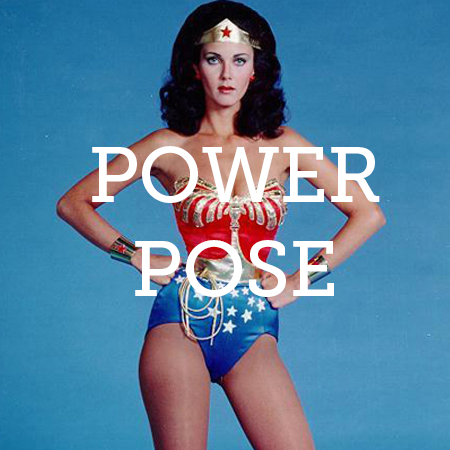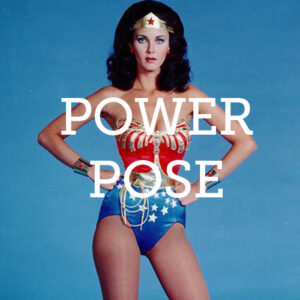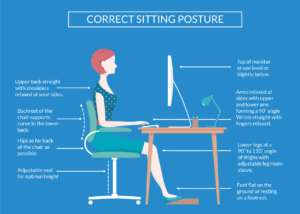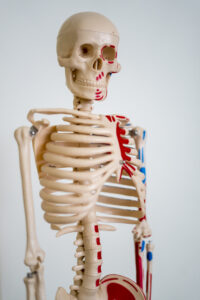
Here’s what Social Psychologist, Amy Cuddy had to say about this in her 2012 TedTalk “Your Body Language May Shape Who You Are”
“Body language affects how others see us, but it may also change how we see ourselves. Power posing — that is, standing in a posture of confidence, even when we don’t feel confident — can boost feelings of confidence, and might have an impact on our chances for success.”
That is so… POWERFUL!
Interestingly, Amy’s research on body language reveals that we can change other people’s perceptions – and perhaps even our own body chemistry, simply by changing body positions.
Doesn’t it make you feel more confident when you just stand a little taller, and not slumped forward with your eyes looking toward the ground?
I sure do! I feel like freakin’ Wonder Woman, in fact!

[image credit: Brain Trainer]
“The human body is the best picture of the human soul.” – Ludwig Wittgenstein
But, what’s posture got to do with anything?
Did your Mother ever tell you to “stand up straight”? Of course she did! And for good reason.
Posture is important to our balance, and not just the act of staying upright on our feet. It allows you to centre your weight over your feet and by being in such alignment, you prevent injury, remain in good form for exercising and this, in turn, increases athletic and performance gains.
But, improving your alignment and balance doesn’t just benefit you in your athletic endeavors – it’s imperative to moving your body in just about every activity, even just standing and walking!
Just think of all the occasions that you’re probably slouching, hunching and craning your neck during the day — while driving, while sitting at your desk, in front of a computer, while standing in the kitchen doing dishes and making dinner…
Is it any wonder why your neck, back, hips & knees are aching by day’s end?

[image credit: – Innovativpt.net]
REASONS FOR POOR POSTURE
For many of us, suboptimal posture is simply the consequence of gravity’s pull on our bodies on a day-to-day basis.
For others, though, it develops as a result of injury, a disease, certain mental health disorders, or through good ‘ol genetics – basically the things you can’t control.
BeatAnxietyNaturally.com says, “Like a frightened hedgehog who curls up into a ball to protect his soft vulnerable abdomen. That’s what we do when we are anxious or depressed, we tend to sit with crossed arms and legs close to the body and shoulders bent at the waist.
This position is normally occupied unconsciously, but it is extremely unhealthy because it presses internal organs including the heart and lungs which further weakens the circulation and causes pain in the muscles, nerves, and tendons.
Other reasons that can result in poor posture:
- Muscle strength affects balance in several critical ways, namely that the “foundational” muscles of the back, side, pelvis, and gluteus (butt muscles) are basically what anchor your upper body to your lower body.
- When these interconnected muscles are weakened, this leads to slumping or a forward-tipping of the upper body.
In my recent article about our body’s connective tissue web (fascia), saying that if it is restricted, muscle contraction is also restricted, and tightened fascia pulls our muscles and skeleton out of proper alignment – causing pain, discomfort, and postural changes.
- Strong lower leg muscles help keep you steady, upright and aligned when standing.
- Inflexible muscles can also be a source of poor posture as they decrease range of motion, i.e. how far a joint can move in any direction.
Some examples: overly tight, shortened hip muscles pull your upper body forward and negatively affect your posture, and overly tight chest muscles can pull your shoulders forward, leading to a rounded or chronically hunched appearance.
- FOOTWEAR: Have you ever seen a woman wearing stilettos with great posture? Nope, me neither.
- STRESS: Whether the source of the stress is physical, mental, real or imagined, it can lead to a decrease in “full” breathing, which in turn causes the body to compensate in posture, as the two often go hand-in-hand.
Check out the two-part series “Stress: It’s a Full-body Response!”
Scientists have shown time and again that bad posture can have a negative impact on health. And it’s no surprise that those experiencing mental health issues, like depression and anxiety, may have a tendency toward developing poor alignment, a feeling of being off-balance and hence, postural issues.
POSTURE & DEPRESSION: slumped mood, slumped posture – or is it the other way around?

A study published in Health Psychology reveals that people who slump appear gloomy and sad compared to those who sit (or stand up) straight.
Dr. Elizabeth Broadbent, Professor at The University of Auckland, and her team, previously conducted separate research which indicates that slouching negatively impacts a person’s mental health.
According to her research, this is because it can damage a person’s self-esteem. She also demonstrated that good posture can build confidence, improve energy levels, and alleviate depression.
In an interview for Psychology Today, Dr. Broadbent said, “Compared to sitting in a slumped position, sitting upright can make you feel more proud after a success, increase your persistence at an unsolvable task, and make you feel more confident in your thoughts.
Research also suggests that sitting upright can make you feel more alert and enthusiastic, feel less fearful, and have higher self-esteem after a stressful task.”
Psychology Today also points out,
“If you have depression that’s causing serious distress and interfering with your daily life, good posture is no substitute for professional treatment. But as an addition to treatment, occasionally reminding yourself to sit or stand up straight might help you feel more upbeat and energetic.”
So, what are YOU going to do to improve your alignment, balance & posture
— AND your mental health?
Book a free assessment with me today